Benjamin Franklin High School team is one of three winning Aspen Challenge teams
This is the second piece in our two-part series on the winners of the Aspen Challenge. You can continue to learn about the challenge through our profile of another New Orleans’ team here.
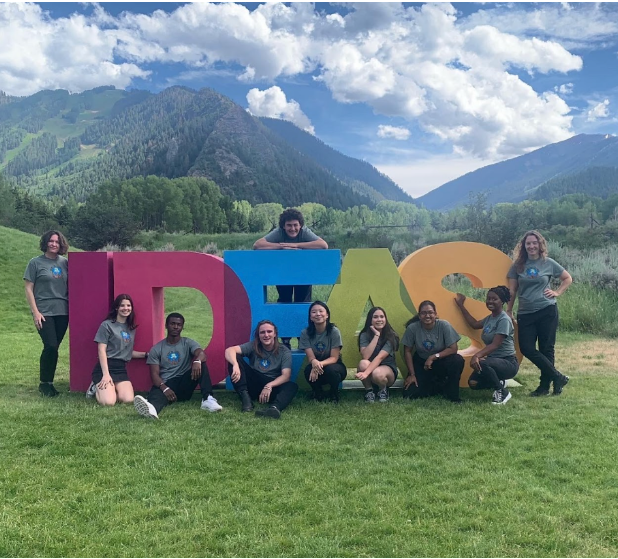
Last year, a group of Benjamin Franklin High School students declared they wanted “second lines, not rising water lines” in our city. As part of the Aspen Challenge program last year, those students formed “Krewe Du Cypress,” and began doing their part to make that vision a reality.
The Aspen Challenge moves to two new cities each year, asking young people to take on some of the most pressing challenges of our time. When, with the support of NSNO, the Aspen Challenge came to New Orleans last year, they gave teams of high schoolers $500 to address one of five challenge areas: the environment, kindness and mental health, transportation, health and nutrition, and narratives of violence.
The teams with the strongest solutions would then bring those solutions to the Aspen Ideas Festival in Colorado, an event in which people engage on key world issues through panels, forums, and talks.
Krewe Du Cypress–-Mandell Blackstone, Jay Garcia, Jack McComb, Stoney McKnight, Audrey Orzech, Akshita Sridhar, Cecile Usdin, and Christina You–responded to a challenge pitched by Dr. Beverly Wright, Founder and Executive Director of the Deep South Center for Environmental Justice at Dillard University. Dr. Wright asked students to educate their peers “about current events and policies that will have long-term impacts on the environment and to create a program that empowers your peers to take organized action against the climate crisis.”
The project
The team got to work. They were brainstorming by the time they got on the bus after the Aspen kickoff event, and they gathered every Friday at lunch to connect and plan.
They were a committed group. They’d applied to be a part of the program and each of them was passionate about the cause.
“I didn’t have to worry about anyone on our team being unmotivated, or feeling like they were forced to do this. Everybody on our team wanted to do it. And they wanted to do it really well,” says Akshita.
Krewe Du Cypress came together around an intention: “We live in New Orleans, a city severely affected by the climate crisis. The sea levels are rising, and both hurricanes and tornadoes are growing more frequent and severe. We want second lines not rising water lines, so we created a solution that not only fights climate change, but also brings our community together.”
Their multi-part solution combined art installations, hands-on community projects, education, and advocacy. They began with the LINES project, a visual marker of Hurricane Katrina’s impact and the threat of climate disasters in years to come. Through LINES, the students used chalk and tape to mark the waterline after Hurricane Katrina on different buildings. They began with their school and the Trinity Community Center, and prepared installations for businesses and restaurants around the city.
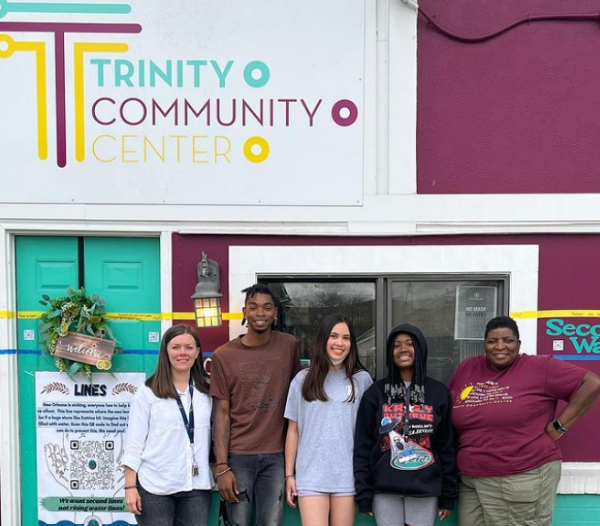
By each waterline, the students set up a QR code that sent viewers to their website, where they’d posted information about climate change and pre-written emails that visitors could send to their legislators. They also posted a guide for people to participate in LINES by adding their own installations across the city.
To engage even more fully with the “educate” goal of Dr. Wright’s challenge, the students created lesson plans to teach about sea level rise, carbon capture, and emissions in our state. They then submitted this to be a part of LSU’s Introduction to Engineering dual enrollment class, which is taught in high schools across Louisiana. It has been preliminarily approved for inclusion in the course, through which it would reach 6,000 students.
They also hosted an Earth Day climate change panel that had almost 90 attendees, and attended a tree-planting event in which volunteers planted one hundred cypress trees along the Lafitte Greenway.
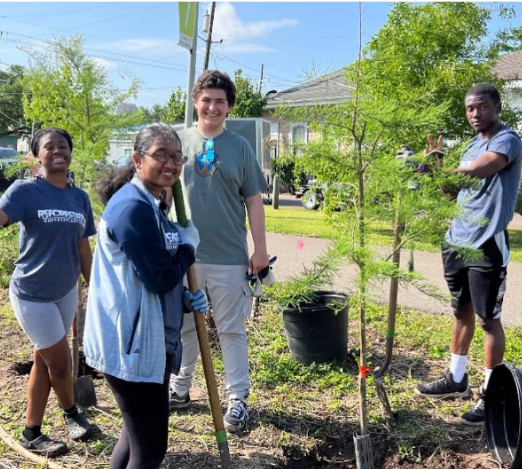
This wide-ranging impact required the unique strengths of each Krewe du Cypress team member. Their faculty sponsors, Rebecca Gaillot and Rachel Becker, had received far more excellent applications for the team than they could select. They made a point to put together a diverse team with different strengths and experiences.
“One thing that really worked for us is that we had such multifaceted members,” explains Christina You. “For example, one member, Jack, had previous experience building websites. So he’s the main person who created our ‘hub’ website. One of our members is really good at reaching out to businesses. So she has a main point of contact for reaching out to businesses and putting up those lines…we really just wanted to play into our strengths and really uplift each other.”
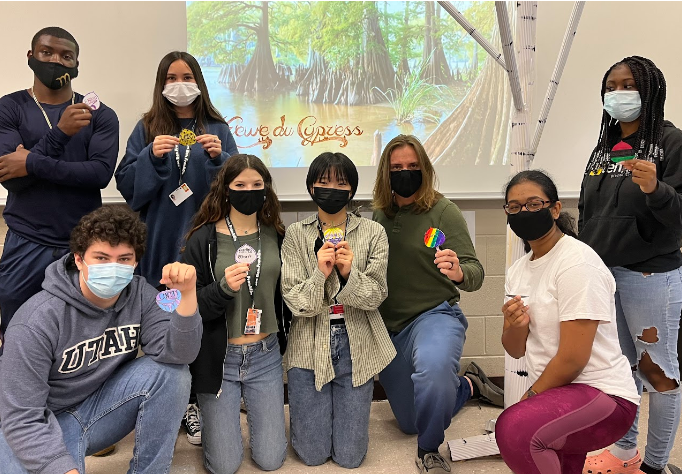
Telling their story
By April, the team was excited to present their work at the Solutions Showcase alongside other New Orleans high schools. They had to both host a “booth” with information about their work and go on stage to describe and answer questions about it.
“One thing I remember one of our teammates saying was ‘no matter what, we’re going to be proud of what we did here today,’” says Christina.
“And we went up on stage, and we did amazing. That was really fun. The experience of putting a lot of work into a solution, but also knowing people recognized us for that, was really fulfilling,” she explains.
The judges gave it the highest possible recognition–Krewe du Cypress was one of three winners chosen to attend the Aspen Ideas festival.
The team didn’t stop working after their win. They hosted a “Cypress Fest” with music, food, activities, and pop up shops in May. Then, in June, they flew to Aspen, Colorado. There, they attended sessions, presented their ideas, and even sat on a panel themselves. They left empowered.
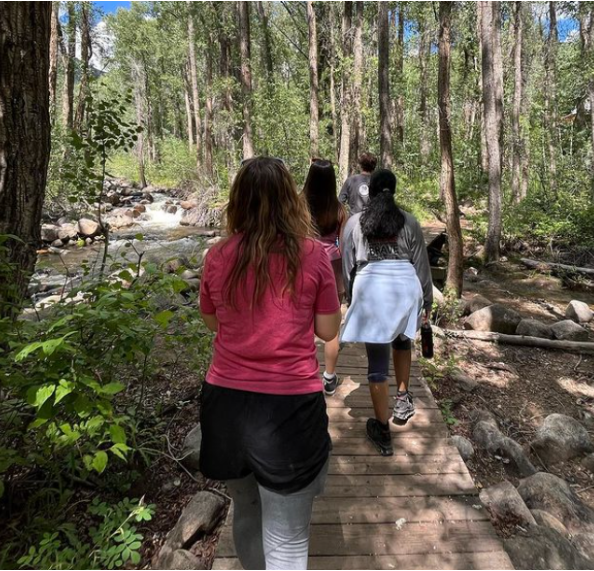
“Usually there are so many adults who, honestly, don’t give that much weight to your opinion. So it was nice that when we went to the festival, everybody intensively listened to what we said,” says Akshita.
No end in sight
As a sophomore, Akshita has a few more years to work on Krewe du Cypress at Franklin. But she says that she isn’t planning to stop once she graduates.
“I don’t honestly think it’s ever ending for me,” she says.
Another sophomore on the team, Audrey Orzech, says she has been transformed by the project, too.
“The Aspen Challenge forever changed my perspective on how much my voice matters,” she says. “This opportunity to make connections and a real difference has changed the trajectory of my life for the better.”
Ms. Becker believes this growth stems from the students being required to “take the plunge” and dive in as leaders on a problem they’ve committed to help solve.

“Putting people in that situation,” she says, “helps people discover that they can. I think every single person on this team now is going to be a bolder risk taker. They’re going to walk into unknowns with more confidence.”
Today, the team is grappling with one big unknown: where do they go from here? Two of the team members were seniors, so now, the remaining group of six is deciding how to operate in a new school year. They’ve been discussing whether or not they want to establish themselves as an official nonprofit.
They imagine Krewe Du Cypress expanding to include students at other schools. They know they’re not the only ones who care about climate change, and not the only ones who are willing to tackle big ideas.
Christina says she saw that firsthand at the Solutions Showcase, where she got to meet students from other Aspen Challenge Teams.
“If this is the future of New Orleans,” she says, “I feel like we’re in good hands.”
